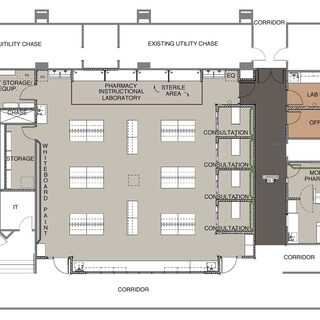Tradeline's industry reports are a must-read resource for those involved in facilities planning and management. Reports include management case studies, current and in-depth project profiles, and editorials on the latest facilities management issues.
Latest Reports
College of Pharmacy Research and Instructional Laboratories
The University of North Texas Health Science Center (UNTHSC) renovated two floors of its Research and Education Building to accommodate a new College of Pharmacy program and the associated accreditation requirements. The spaces include both instructional and research labs.
Warren Woods Ecological Field Station
The University of Chicago’s two-story, 2,450-sf Warren Woods Ecological Field Station is the first Passive House-certified laboratory in North America and only the fifth in the world. “Passive House” standards achieve minimal energy usage for heating and cooling, despite the presence of a minus-80-degree-Celsius freezer, plant growth chambers, an incubator, and tools for DNA extraction, all of which generate a lot of heat, coupled with a humid environment and a high level of occupancy by researchers.
Maximizing Operating Efficiency of High-Containment Labs
Researchers at Duke University Medical Center’s Regional Biocontainment Lab (RBL) recently organized and launched a select-agent-based study in just 30 days from inception to conclusion, thanks to the organization’s highly efficient operational framework. Fast tracking of the study—which involved aerosol exposure of 38 immunized mice to Francisella tularensis, the causative agent of tularemia—was made possible through the facility’s strategic management and cross-trained staffing model.
Shared Office Space for Physicians and Clinicians
The renovated OB-GYN academic offices at Boston’s Beth Israel Deaconess Medical Center (BIDMC) eliminate private offices in favor of shared desks and open concept space, to accommodate a planned 20 percent staff increase while decreasing total departmental square footage. The department, which previously housed about 80 people in 14,000 sf, can now accommodate 106 people in 13,000 sf. The gut-and-rebuild also improves ADA compliance for the 1950s building and provides more natural light and collaborative space.
University of Washington, School of Medicine, South Lake Union 3.1
The seven-story “3.1” research building on the University of Washington Medical School’s South Lake Union campus adds 160,000 nsf of research and research support space for more than 300 occupants to a seven-building master plan totaling 1.2 million gsf.




